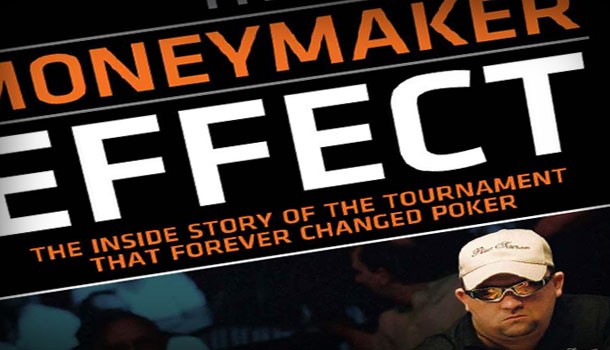
2014 has been a terrific year for poker books.
First I was pleasantly surprised by Dutch Boyd’s self-published contribution to the poker pantheon, and soon after finishing Dutch’s Poker Tilt I dug into Eric Raskin’s The Moneymaker Effect: The Inside Story of the Tournament That Forever Changed Poker, a continuation/expansion of his 2013 Grantland.com article When We Held Kings, which is the single best poker article I have ever read, and I have reread the entire thing multiple times.
Both of these books (Poker Tilt and The Moneymaker Effect) are instant classics, and were immediately thrust into my Top 10 Poker Books of all-time list, right alongside Positively Fifth Street, Big Deal, Ghosts at the Table, The Biggest Game in Town, One of a Kind, Titanic Thompson: The Man Who Bet on Everything, The Professor the Banker and the Suicide King, and several other great tomes I’m probably overlooking at the moment.
A Great Writer + A Great Story = Instant Classic
If you haven’t gotten the message, let me be very clear: I did not like The Moneymaker Effect, I absolutely loved it. I tore through this highly readable book in two sittings, devouring the “stories behind the story” of Chris Moneymaker’s 2003 World Series of Poker victory.
As I read through The Moneymaker Effect I could envision the ESPN broadcast of the 2003 Main Event that I have probably watched dozens of times appearing on the pages, and could vividly recount the hands that I haven’t seen in over five years unfolding on every page I turned.
I could visualize the conversations in the hallways of Binions (a place I have never set foot in) between people (some I have never met) vividly, and that is a testament to Eric Raskin’s storytelling ability.
Beyond being a page turner, the information in this book is an extremely important piece of poker history, and had Raskin not chronicled these behind the scenes missives and anecdotes I have a feeling most of it would have been lost to time, like so many other poker tales that live on somewhere between legend and reality.
Seriously, who is going to approach Annie Duke and Howard Lederer in 2014 for their thoughts on the 2003 WSOP?
Who had even heard of the name David Gamble before Raskin brought Moneymaker’s “other” backer to light in his Grantland piece?
Who would think it important enough to track down the producers and A/V guys from ESPN and 441 Productions?
Who would have had the foresight to not just interview Norman Chad and Lon McEachern but to make their journey to the 2003 WSOP an interesting plot line?
This was the defining poker moment of our era (and perhaps the defining moment in poker history) and had Raskin not chronicled what happened behind the scenes and what the general feeling of the poker community was at the time it would almost certainly have fallen by the wayside.
T.R.O.Y. (They Reminisce Over You)
Reading The Moneymaker Effect brought me back to 2002/2003 when there was a certain charm and innocence to poker. When the poker world was little more than a small collection of players struggling to make it in a cutthroat world when suddenly a Golden Egg laying goose fell in their lap, with the apt name of Moneymaker.
Moneymaker not only lit the fuse for the Poker Boom but he also bridged the gap between the familiarity and closeness of the live poker community pre-Internet poker and the globalization and anonymity of online poker.
Sammy Farha was the known quantity, part of the clique, and Moneymaker was the unknown outsider. The unknown outsider won and poker was changed in an instant.
The following year thousands of unknowns showed up at what had once been a private party, and the next year thousands more from every corner of the globe arrived, all set on becoming the next Chris Moneymaker.
As someone who lived through that period in the poker world I think Raskin and the numerous people he interviewed captured it all perfectly: We all knew something important had just happened and that poker was about to change, but nobody anticipated just how important that moment was or how pronounced the change would be.
Even as the 2003 WSOP was playing out in real-time the biggest story on the poker forums of the day was Dutch Boyd and the money he owed from PokerSpot. It wasn’t until Chris Moneymaker won that it even started to dawn on people what had just occurred.
Every subsequent trip I took to Foxwoods I saw more and more new faces; anonymous faces. Faces that had that “sky’s the limit look on them.”
I saw Limit Holdem and Stud tables give way to No Limit games; an unheard of cash game structure prior to 2003.
It wasn’t overnight, but the floodgates had been opened, and slowly but surely, day by day, it dawned on everyone that the Poker Boom was upon us.
To hear Raskin and the people involved with the 2003 WSOP tell their versions of what happened allowed me to relive this period in time (and it was a hell of a period for poker players) and if you weren’t involved in poker back then, if you were a product of The Moneymaker Effect and the Poker Boom picking up a copy of Eric Raskin’s The Moneymaker Effect will give you a chance to see what it was like to live through this time.
You can purchase the Moneymaker Effect at Amazon.com in either paperback or Kindle format.
And for those of you who got the T.R.O.Y. reference


